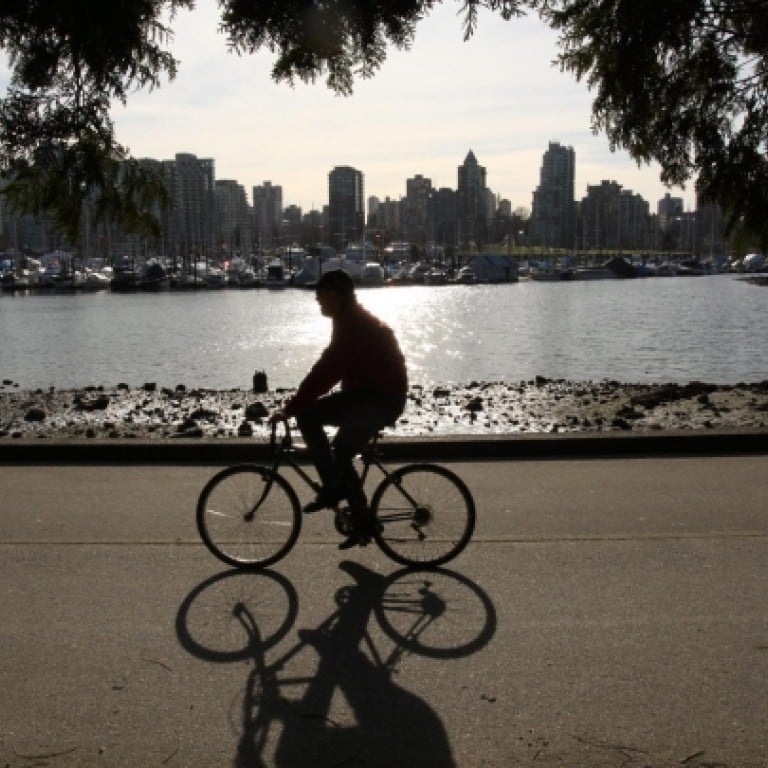
Rich foreign investors drive up home prices in Vancouver, locking out locals
Prices for homes have risen to an average of US$1m in a city where the average income is US$41,000, so many locals are excluded from market
Vancouver has become such a popular destination for overseas investment that locals can scarcely afford the price of an average house in the city.
And because many of the new flats in some areas are purchased by investors who then leave them empty, local businesses are having a hard time surviving.
On paper, Vancouver is not a wealthy city. But it is a city that is attractive to wealthy overseas buyers, mostly from mainland China, who are driving up prices. Unable to afford real estate, the locals are struggling, and the numbers tell the story.
The average selling price of a small house in Vancouver is more than US$1 million, according to the Royal LePage House Price Survey released in April. The average income in Vancouver is US$41,176 a year, according to the most recent figures. With that income, it's almost impossible to purchase a detached house.
Developer Thomas Fung, who built the Aberdeen Mall in Richmond, outside Vancouver, has major plans for more developments around Vancouver. He says overseas investors are driving the Canadian residential market, with buyers coming from China, Korea, the United States, the Middle East and Russia.
Investors are either securing their money in real estate for several years, or purchasing pre-sale properties and flipping them for tremendous profits. He has an office and retail project under construction, and already has had several of the pre-sale purchasers flip their spaces for around 50 to 60 per cent profit.
"A lot of investors want to park their money so they have something real, such as real estate. It's safe," said Fung, seated in the noodle house he owns inside the luxury Asian shopping mall.
Of course, it depended on the property, he said. It has to be the right price and location.
And because of residential property investments, certain parts of the city are underpopulated. In downtown Vancouver's Coal Harbour, an estimated 23 per cent of all condos are empty. The wealthy owners have not rented them out.
"People who can afford to buy those condos are so rich they don't even care about the return on their investment," Fung said.
For florist Tim Hiltz, however, the empty condos have ruined his dreams of running a store in Coal Harbour. Because so many of the condos sit empty, and many of the residents return to China or the US for half the year, his business is failing.
"It's easy to understand why Vancouver attracts people from around the world," Hiltz said. "But when neighbourhoods experience dramatically low occupancy rates for a significant part of the year, it's impossible to sustain a small business, because there are so few residents."
Businesses might not be the only casualties of this investor behaviour. David Ley, a geography professor and author of the book , said there was evidence that residents were leaving Vancouver to find more affordable housing elsewhere. Foreign investors were not the only ones to blame, either, he said, and retirement-age Canadians who had made money were also investing in property.
But regardless of where they were from, it was the investor who had truly changed the real estate landscape, and for the past couple of decades, local incomes have been unable to keep up. "If there were far fewer investors, we would see quite a different property market," he said.
Some speculate that local developers are building one-bedroom flats specially targeted for the foreign investor market, instead of first-time buyers who will live in the flats.
Sandy Garossino, a high-profile businesswoman and lawyer, is outspoken about the imbalance such a market has created and says that the investor-buyer is creating a bubble situation. "New development suggests to me that it's a market of speculators, because they are driving market confidence," she said.
Andy Yan, a part-time urban planning instructor at the University of British Columbia who works for Bing Thom Architects, said it was impossible to accurately gauge the extent of empty flats, but their impact was felt. Vancouver, he said, needed to maintain affordable housing.
"What's hard to measure about this city is how fast it's changing," Yan said. "This type of investor behaviour has certain consequences, good and bad. The issue is, how do you mitigate the negative aspects of that behaviour when it comes to prices?"
How to intervene on issues of affordable housing and economic development was a big, difficult question, he said.
But developer Will Lin believes the problem will wane because speculators are not making the money they once did, prior to the world banking crisis.
"There was a short period when speculators made good money, but no more. The market has and will continue to weed out the speculators," he said.
For the average local home seeker that could not come soon enough. The city was ranked as the most expensive in which to live in all of North America - ahead of New York and Los Angeles - according to a report earlier this year from . And most experts and investors agree there is no reason for overseas investment to slow in the next few years. "The way I see it, and probably the other investors see it too, if you invest in a prominent location here, you can't go wrong," Fung said.
